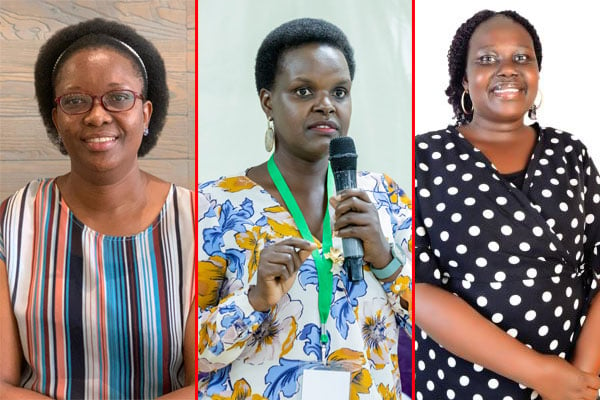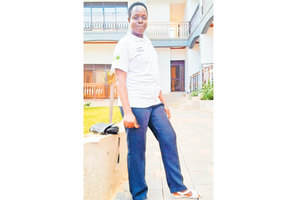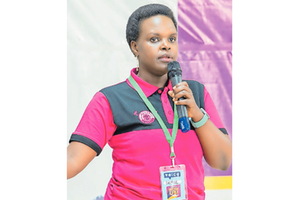
Cancer survivor Rinet Nalugo Musana at Uganda Cancer Institute on October 16, 2024. PHOTO/GLORIA IRANKUNDA
At 15, Rinet Nalugo Musana noticed small, painless lumps beneath the skin around her neck.
Uncertain of their cause, she carried on with life, confused yet undisturbed by the lumps.
As she grew older, however, she began experiencing recurring bouts of malaria and developed a persistent cough with chest pain.
"There were times I felt fine but every three months, without fail, the cough, flu, and malaria stubbornly returned," Ms Nalugo, now 53, says.
In April 2000, Ms Nalugo experienced joint pain and a loss of appetite, prompting her to visit Mengo Hospital where she suspected another episode of malaria. By then, the painless lumps around her neck had noticeably grown.
“They looked like mumps,” she explains. When the doctor inquired about them, she replied: “I do not know.” He handed her a note, referring her to a specialist at the Albert Cook Building in Mengo Hospital.
At Albert Cook, the doctor suggested the possibility of lymphoma cancer.
“He told me to return the next day with my husband for a biopsy,” Ms Nalugo recalls.
Anxious wait
The following day, the biopsy was performed.
“He packaged the sample carefully and instructed me to take it to a laboratory in Wandegeya. After two weeks, the results were ready,” she narrates.
“When I returned, he confirmed it was non-Hodgkin lymphoma cancer and offered me counselling, noting that while some cancers can be cured, others cannot. He created a file for me to take to the Uganda Cancer Institute [UCI],” Ms Nalugo adds.
Reflecting on her diagnosis, she admits that the news did not scare her.
“I am unsure how it had happened,” she shares, crediting her strength to the fellowship and community support that had always been a cornerstone of her life.
Ms Nalugo began her treatment at the UCI immediately after receiving her results.
“We live in Mukono but the following day after the results, my husband and I arrived at UCI by 7am. We waited until finally seeing the doctor at 5pm. There were many patients; children, women, and men all mixed,” she reflects on the exhausting day.
She met Dr Jackson Orem who instructed her to return the next day at 10 am. “When I arrived, he was welcoming and offered me counselling,” she shared.
Tests
Dr Orem took several blood samples and that of the bone marrow, advising her to return the next day. Ms Nalugo began chemotherapy immediately, starting with two weeks of tablets, followed by four and a half months of injections in six cycles.
“I used to cough frequently. I had the first attack at night, and my husband rushed me to Mengo Hospital for oxygen support. The second time, we went to UCI, where I was diagnosed with pneumonia,” she recalls.
In the course of her treatment, Ms Nalugo developed a pimple on her cheek. After squeezing it, her face got swollen, but she had a review appointment at UCI that day.
“By the end of the day, my condition worsened; I became disoriented and lost consciousness. My younger brother, who was with me, panicked and started making calls. I was admitted that same day,” she says.
During her first two days in the hospital, she experienced hallucinations and nightmares.
“I was often unconscious. My husband even brought a priest for last rites, fearing the worst; at times, I felt a surge of energy but lost touch with reality, seeing myself among deceased relatives,” she shares.
She noted that her children and husband had lost hope, often crying, fearing she might not survive.
“My youngest child had not started school and did not understand what was happening. That was the hardest part for me, knowing my children were so young,” she reflects.
Ms Nalugo’s other side effects included hair loss, cessation of her menstrual periods, blackened nails, and red lips. She lost significant weight, dropping from 70 to 47 kilogrammes.
Despite the challenges, she found hope after chemotherapy when doctors shared promising blood results. She credits her husband for his unwavering support. “All my medical costs were covered by his insurance, allowing me to access treatment promptly,” she said with a smile.
Community support
After surviving cancer, Ms Nalugo was invited to join the Uganda Cancer Institute Research and Ethics Committee (UCIREC) as a community representative.
"I serve as a link between researchers and the community, providing counselling and raising awareness at gatherings like church. I teach people how to perform self-examinations for breast cancer and discuss other types of cancer,” she shares.
She advises her community to prioritise health by eating fresh, chemical-free fruits and vegetables, pumpkin seeds, and avoiding oils and processed foods. “They should also refrain from smoking,” she suggests.
New life
Ms Nalugo now grows vegetables in her garden and makes porridge from whole maize sourced from her land. She cultivates orange sweet potatoes, rich in Vitamin A, which she encourages mothers and children to consume.
Even though she is cancer-free, Ms Nalugo visits UCI whenever she feels unwell. “People should always seek medical check-ups when they feel sick. If symptoms persist, they should not hesitate to visit another hospital,” she advises.
“Many go to pharmacies or clinics to buy medication without a proper check-up. It is essential to get a diagnosis before starting treatment. Never label your illness without consulting a doctor,” she emphasises.
DMs Nalugo encourages patients to follow their doctors' advice and not rely solely on herbal remedies. She expressed gratitude to the UCI doctors who supported her, her husband, and God for her healing.
“I have been gardening since 2006 when I was declared cancer-free. I grow cassava, potatoes, beans, and maize for our consumption. I also have a few goats and two cows that I plan to start milking soon. We have four children-three girls and one boy. All are married except our youngest, who will graduate next year,” she shares.
ABOUT THE CANCER
According to the Uganda Cancer Institute, non-Hodgkin lymphoma is a disease in which malignant (cancer) cells form in the lymph system. Non-Hodgkin lymphoma cancer can be indolent or aggressive. Older age, being male, and having a weakened immune system can increase the risk of the cancer Signs and symptoms of non-Hodgkin lymphoma include swollen lymph nodes, fever, drenching night sweats, weight loss, and fatigue. Tests that examine the lymph system and other parts of the body are used to diagnose and stage non-Hodgkin lymphoma. In addition to asking about your personal and family health history and doing a physical exam, your doctor may perform tests such as a complete blood count(CBC), blood chemistry studies, Hepatitis B and Hepatitis C test, HIV test, CT scan, bone marrow aspiration and biopsy, and lymph node biopsy.




